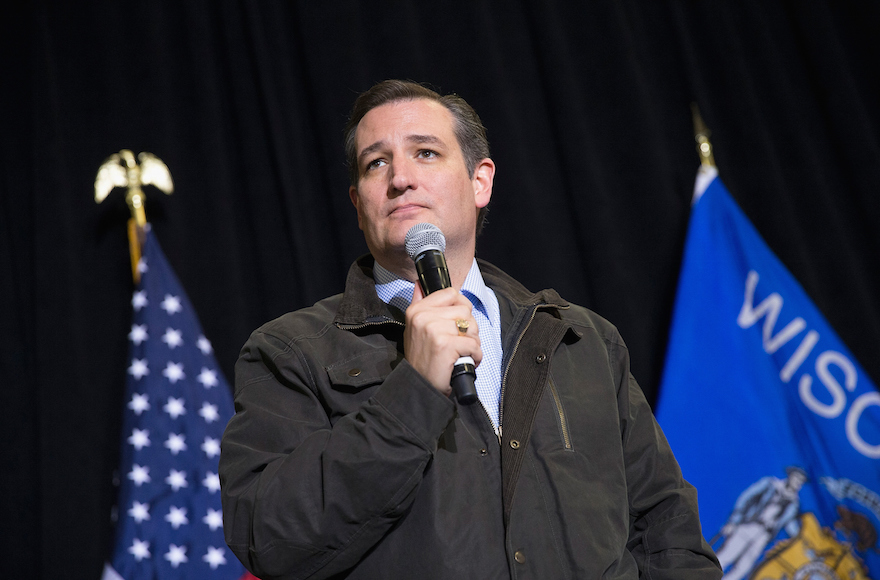After Cruz drops out, Trump is the presumptive Republican nominee
Published May 3, 2016

Ted Cruz speaking to workers at Dane Manufacturing in Dane, Wisconsin, March 24, 2016. (Scott Olson/Getty Images)
WASHINGTON (JTA) — Donald Trump became the presumptive Republican nominee for president after trouncing his opponents in Indiana, driving Ted Cruz out of the race.
Bernie Sanders, the Independent senator from Vermont, bested Hillary Clinton in Indiana’s primary on Tuesday, but the former secretary of state still has the advantage in the Democratic race.
“.@realDonaldTrump will be presumptive @GOP nominee, we all need to unite and focus on defeating @HillaryClinton #NeverClinton,” Reince Priebus, the chairman of the Republican national Committee, said on Twitter after polls closed, when it became immediately clear Trump had swept the state.
Still in the race is Ohio Gov. John Kasich, but he has zero chance of catching up to Trump, who has 1,007 of the 1,237 delegates needed to win the nomination. Kasich has 153 delegates.
Trump, a real estate magnate and reality TV star who has run a scorched earth campaign defining his opponents as losers and prevaricators, would be the first Republican nominee never to have served in government or as a military leader since Wendell Willkie, the business executive defeated by Franklin Delano Roosevelt in 1940.
His Cruz bashing went to new lengths the day of the Indiana vote when, in a Fox News Channel interview, Trump appeared to accuse the Texas senator’s father of involvement in the John F. Kennedy assassination, while producing no credible evidence.
Cruz responded by calling Trump a “pathological liar” and “utterly amoral,” yet after Cruz withdrew Tuesday night, Trump praised his rival, calling him “brave” and “a hell of a competitor.”
Cruz bowed out in a speech to supporters who wailed and cried out “No!” He said Trump’s win in the state had “foreclosed” his path to the nomination; notably, he did not praise or congratulate Trump.
Cruz’s withdrawal means that an unalloyed supporter of the right-wing pro-Israel outlook will for the first time since Sen. Robert Dole’s nomination in 1996 not represent the Republican Party in the general election.
Trump has in recent weeks played up his pro-Israel rhetoric, but in December, when he spoke to the Republican Jewish Coalition while the field was still crowded, he said he would be neutral in brokering Israeli-Palestinian peace and he would not commit to recognizing Israel’s capital as Jerusalem.
He walked back those positions in March when he addressed the American Israel Public Affairs Committee, but his speech notably did not mention defense assistance to Israel. Trump had, the same day of the AIPAC speech, said he would consider including Israel among the countries he believes should pay for U.S. protection.
Trump told the Daily Mail in an interview reported on Tuesday that there should be no “pause” in Israeli settlement building, as President Barack Obama has demanded.
‘No, I don’t think there should be a pause,’ he said. ‘Look: Missiles were launched into Israel, and Israel, I think, never was properly treated by our country. I mean, do you know what that is, how devastating that is?’
Trump in his speech at his headquarters in New York showered praise on his family, including his Jewish son-in-law Jared Kushner. “We’re going to start winning again and we’re going to win big league, believe me,” Trump said.
He called for GOP unity and thanked Priebus for his support. “We have to bring unity,” Trump said.
Sanders, the first Jewish candidate to win major party nomination contests, bested Clinton 52.5 percent to 47.5 percent in Indiana, his 18th state victory.
Sanders said the win kept him in the race, although Clinton’s 2,220 delegates out of the 2,383 needed to win make her the prohibitive favorite. The next Democratic contest is in West Virginia on May 10.













